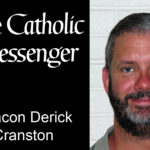The first chapter of a lesson plan for fifth-graders in a religious education class last weekend focused on God’s plan for all creation. “One way to show your gratitude to God for all of his gifts is to care for the Earth and all of its creatures,” the teacher’s edition of the workbook states (“Alive in Christ,” Our Sunday Visitor).
How appropriate, given the fact that Catholics and other Christians of various faith traditions are in the midst of celebrating “The Season of Creation” with prayer and action to protect creation. The season began Sept. 1 and continues through Oct. 4, the feast day of St. Francis of Assisi.
A synopsis of the Season of Creation calls for a three-pronged approach to the celebration. We thank God for the wonderful handiwork God has entrusted to our care, implore God’s help for the protection of creation, and ask God’s pardon for sins committed against the world we live in.
There can be no argument that we have a responsibility to take care of the earth and all of the life it holds. God gave us dominion — a responsibility, not domination — for the care of planet earth. That responsibility includes advocating for systemic changes that will protect our land, water and all the creatures who inhabit planet earth. We are all connected — and not just digitally.
Pope Francis brought Catholics into the annual celebration of The Season of Creation in 2015, the same year he released his encyclical “Laudato Si,” a masterpiece on how we are to be in relationship with God, neighbor and the earth. In that document, Pope Francis brings attention to our “throw-away culture,” an attitude that breeds wasteful habits and a disregard for God’s gifts, including people.
The U.S. Conference of Catholic Bishops (USCCB) has posted a bulletin insert on its website (https://tinyurl.com/y4o3kccq) for individuals, families and communities to celebrate the Season of Creation:
• Reaffirm our vocation as stewards of creation. We are encouraged to identify ways in which we can choose reusable items rather than disposables, such as coffee mugs, reusable bags or cloth napkins. Commit to making one change this month. Communities can participate in an educational program titled “Befriend the Wolf” from the Catholic Climate Covenant to reflect on our vocation as stewards of creation (bit.ly/CCC-BTF).
• Giving thanks for God’s handiwork. We are invited to pray before and after meals, giving thanks for the food that sustains and nourishes us. We are to think about how nourishment ultimately comes from the earth and we are to give thanks for the people who helped bring the food to our table. As a community, we are invited to host a care for creation-themed eucharistic adoration in our parishes. A resource to do so is available at bit.ly/PCJP-EA. It was created by the Vatican’s Pontifical Council for Justice and Peace.
• Implore God’s help and ask for God’s pardon. Pope Francis emphasizes the importance of examining our consciences, recognizing our sins against creation. “Seeing the interconnectedness of our world leads to an understanding that ‘[e]very violation of solidarity and civic friendship harms the environment’ (Caritas in Veritate, no. 51).” Individuals and families are invited to bring these sins to confession and to perform a spiritual work of mercy for our common home.
Communities are invited to organize and use a four-part prayer service developed by the Catholic Climate Covenant. The prayer service can be held indoors or outdoors and prayed after Mass each week. Read more about it at bit.ly/CCC-PS.
More information about the origins, history and activities of The Season of Creation are available at the website https://seasonofcreation.org/about/.
In addition to the activities listed above, contact our U.S. senators from Iowa and urge them to support the International Climate Accountability Act (S.1743), which calls for the U.S. to remain a global leader in the effort to address climate change. The bill also seeks to have the Trump Administration submit a plan that provides for our nation to meet our commitments under the Paris Agreement. The U.S. House of Representatives passed a similar bill, The Climate Action Now Act (H.R. 9) in May.
The Paris Agreement is a landmark document approved by more than 190 nations — including the U.S. — aimed at strengthening the global response to the threat of climate change. The USCCB, Pope Francis and “the entire Catholic Church, have consistently upheld the Paris Agreement as an important international mechanism to promote environmental stewardship and encourage climate change mitigation,” the U.S. bishops wrote after President Trump withdrew from the Paris Agreement in 2017.
For the sake of those fifth-graders, and generations to follow, we need to celebrate the Season of Creation year-round.
Barb Arland-Fye, Editor
(arland-fye@davenportdiocese.org)











